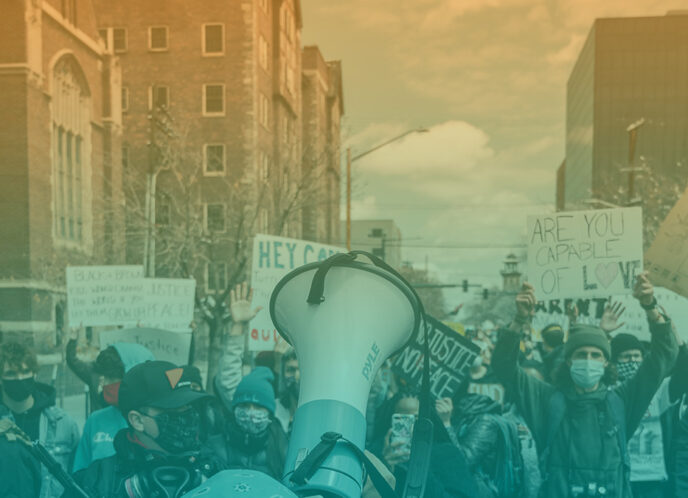For Immediate Release: April 7, 2020
Contact: Duncan Bartok, [email protected], (425) 780-9558
CIVIL RIGHTS ORGS TO FCC CHAIRMAN PAI: INCARCERATED PEOPLE MUST STAY CONNECTED TO FAMILIES DURING COVID-19 CRISIS
Groups file formal comment with FCC to make calls for incarcerated individuals free as families fight to stay connected through health crisis
Today, a coalition of 64 civil and human rights organizations called upon the Federal Communications Commission (FCC) to ensure families of people who are currently incarcerated can communicate with their loved ones. The groups, led by MediaJustice, submitted a letter to FCC Chairman Pai and Commissioners O’Rielly, Carr, Rosenworcel and Starks, requesting that the the Chairman ask companies serving incarcerating institutions to join his Keep Americans Connected Pledge and also ask them to offer free telephone and video calls for the next 60 days with no fees. Jails and prisons across the country have suspended in-person visits in response to the COVID-19 pandemic, forcing incarcerated people and their families to rely on usuriously expensive phone, video calls and emails.
The filing endorses an open petition, announced two weeks ago, calling upon the FCC to put an end to exploitative prison phone profiteering. The petition is currently garnering support from thousands of individuals from all over the country.
Read the letter here.
Read MediaJustice’s petition here.
Read MediaJustice’s announcement here.
People who are currently incarcerated are among the most at-risk for contracting COVID-19 because they are subject to unhealthy living conditions and cannot physically distance themselves from others. In public health emergencies like this, phone and video calls are not only a matter of civil rights and public health, they also help alleviate isolation and stress, which have been shown to significantly weaken the immune system — putting people at even greater risk of falling ill.
The letter asks the FCC Chairman to:
- Request that predatory prison phone companies offer free phone and video calls with no fees to incarcerated and detained individuals immediately for the next 60 days;
- Call on the prison phone industry to agree to the Chairman’s Keep America Connected pledge.
- Deny requests by Securus and other prison telecom companies requests’ to stop paying into the Universal Services Fund
Prison telecom companies are not doing enough to address this crisis; even as more than 500 companies agreed to the Keep America Connected Pledge, only one small prison phone company has joined this commitment.
The filing calls upon Chairman Ajit Pai to demand prison phone companies step up and provide free phone and video calling, without fees, to incarcerated individuals starting immediately for the next 60 days.
Moreover, at a time of national emergency, Securus Technologies—one of the major prison telecom companies—has filed a request for an emergency waiver to avoid its obligation to pay into the Universal Service Fund, which supports affordable communications for low-income people, schools, libraries, rural telehealth providers and rural consumers. Securus is attempting to exploit the current crisis to gain traction for a previous request by the industry to be exempted from supporting the Universal Service Fund altogether. As the letter explains, neither request should be granted. In a time when we all need to stand together, Securus and other prison phone companies are trying to shirk their responsibilities for affordable communications for all people.
Said Myaisha Hayes, Campaign Director at MediaJustice:
“For the past decade, predatory prison phone companies have raked in billions from families desperate to keep in contact with their loved ones. In light of this global pandemic, in-person visitations have been dramatically reduced or suspended, forcing families to pay exorbitantly high prison phone rates to confirm the safety and well-being of their loved ones. This is exploitation and is unacceptable. It’s time for the FCC to finally step in and protect families”
Said Cheryl A. Leanza, policy advisor of the United Church of Christ’s media justice ministry, OC Inc.:
“The MediaJustice campaign on behalf of incarcerated people and their families for communications justice during the COVID-19 crisis has drawn the support of many national organizations nationwide who sought to make their views known in this letter.
“During this crisis, so many are suffering, and yet most people in the U.S. are able to at least communicate with their loved ones. Not so for those whose family members are in prison, jail or detention. No one should have to bear the anguish of this crisis, exacerbated by the unimaginable burden of being unable to find out if your son, grand-daughter or husband is safe. Families and loved ones supporting incarcerated people should be the first people receiving protection and aid, not the last. Over sixty national organizations urge Chairman Pai to do the right thing and immediately call on the telecommunications companies serving incarcerating institutions to offer free communications for 60 days.”
Said Wandjell Reneice Browning, directly impacted advocate:
“Children of incarcerated individuals have been left out of the conversation when it comes to parental and financial support during this COVID-19 pandemic. The very last concern a child should have is if they’ll be able to speak with their loved one during this frightening time in our nation. Imagine being a scared child thinking the world was about to end, and you couldn’t speak to your loved one.”
Said Terence Anthony Long, communications director at the Ella Baker Center for Human Rights:
“It is especially inhumane for prison phone companies to be gouging families during this pandemic, when one of the few ways to stay in touch with incarcerated loved ones is through phone calls. According to our research, the outrageous fees for prison phone calls mainly impact low-income black and brown women who take on huge financial burdens to keep their families connected.”
Said Lex Steppling, director of campaigns and policy at Dignity and Power Now:
“Calling loved ones from inside should have never been commodified in the first place. Crisis moments like these often highlight and amplify long-standing and egregious problems that live inside systems, especially cynical systems like our criminal punishment program. Phone calls and digital calls must be free, and hours for calling must be expanded. Anything less is an affront to the millions of people across the country who continue to have their families harmed by incarceration and detention.”
Said Bianca Tylek, executive director of Worth Rises:
“Just when we think they have exhausted all the ways to prey on incarcerated people and their families, prison telecom corporations shock our consciences with new ones. Their brazen request for emergency relief from paying their fair share to support low-income families with telecom services and grossly inadequate solutions for connecting families and their incarcerated loved ones make a mockery of the stress that COVID-19 has imparted on these vulnerable families. It’s predatory and it’s shameful, but FCC Chairman Pai can and must put pressure on them to make all prison and jail communication free.”
###
MediaJustice is dedicated to building a grassroots movement for a more just and participatory media—fighting for racial, economic, and gender justice in a digital age. MediaJustice boldly advances communication rights, access, and power for communities harmed by persistent dehumanization, discrimination and disadvantage. Home of the #MediaJusticeNetwork, we envision a future where everyone is connected, represented, and free.



